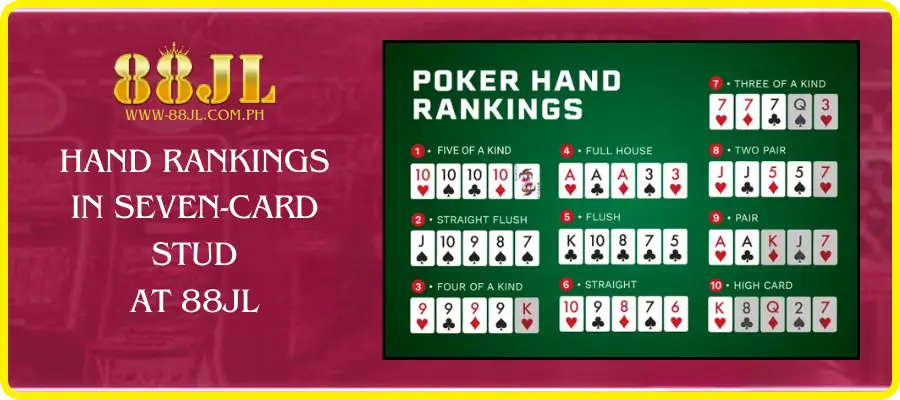Seven-Card Stud Poker is a classic poker variant that challenges players with its strategic depth and betting structure. Unlike Texas Hold’em, this game does not use community cards, and each player works with their own set of seven cards to create the best five-card poker hand. At 88JL, players can enjoy Seven-Card Stud with exciting payout rates and competitive stakes, giving both beginners and seasoned pros a chance to win big.

If you’re ready to join the action, it’s quick and easy to Register on 88JL. By completing a simple registration process, you’ll gain access to the platform’s exciting poker games and tournaments.
Betting Structure and Payouts in Seven-Card Stud
At 88JL, the betting structure for Seven-Card Stud offers players flexibility and generous payout opportunities. Here’s how the betting works:
- Ante: Players must place an initial bet, known as the ante, to participate in the game. The ante is a small portion of the minimum bet.
- Example: Ante is typically 1/5 of the small bet. If the minimum bet is ₱100, the ante would be ₱20.
- Third Street Bet: After the first three cards are dealt, the player with the lowest face-up card must place the “bring-in” bet. This is a forced bet and the amount is typically a fraction of the small bet.
- Example: Bring-in bet can be set to ₱50 if the small bet is ₱100.
- Fourth Street to Sixth Street: In each round after the third card, the player with the highest face-up cards starts the betting. The betting typically follows the small bet structure on Fourth Street, with increases to the big bet from Fifth Street onwards.
- Example: Small Bet: ₱100, Big Bet: ₱200.
- Seventh Street (River): The final round of betting takes place after the seventh card is dealt face down. Players can either match the big bet, raise, or fold based on their hand’s potential.
Once you’ve learned the betting structure, make sure to Login to your 88JL account to start placing bets. The Login process is quick and gives you instant access to all available poker tables.
Payout Percentages for Seven-Card Stud at 88JL
At 88JL, Seven-Card Stud Poker offers some of the most favorable payout percentages, with a payout rate (RTP) of 96-98% depending on the stakes and level of play. This means that for every ₱100 bet, players can expect an average return of ₱96 to ₱98, making it one of the best poker options for serious players who aim to maximize their winnings.
- Low Stakes: RTP between 96.6% to 97%, suitable for casual players.
- High Stakes: RTP closer to 98%, ideal for more experienced and high-stakes players.
Additionally, 88JL offers progressive jackpot opportunities for specific poker tournaments, allowing players to win massive cash prizes beyond the standard table payouts.
Hand Rankings in Seven-Card Stud
As with other poker variations, the hand rankings in Seven-Card Stud are as follows (from highest to lowest):
- Royal Flush: A, K, Q, J, 10, all of the same suit – Payout 100:1
- Straight Flush: Five consecutive cards of the same suit – Payout 50:1
- Four of a Kind: Four cards of the same rank – Payout 25:1
- Full House: Three cards of one rank and two cards of another – Payout 10:1
- Flush: Five cards of the same suit, not in sequence – Payout 8:1
- Straight: Five consecutive cards, not of the same suit – Payout 6:1
- Three of a Kind: Three cards of the same rank – Payout 3:1
- Two Pair: Two cards of one rank, two cards of another – Payout 2:1
- One Pair: Two cards of the same rank – Payout 1:1
- High Card: The highest card in your hand if no other combination is made.

After you’ve secured a win with a strong hand, don’t forget to Withdraw your earnings. 88JL offers a simple and quick Withdraw process, so you can access your winnings without hassle.
Key Strategies for Seven-Card Stud Poker
Mastering Seven-Card Stud Poker involves understanding betting patterns and using strategic insights. Here are some critical strategies:
1. Track Exposed Cards
Since several cards are dealt face-up in Seven-Card Stud, it’s crucial to monitor which cards have already been dealt to your opponents. This will help you understand how many cards are still in play that could improve your hand or how many cards are no longer available to help your opponent. Adjust your strategy based on this information.
2. Betting Wisely with Strong Starting Hands
Starting strong is crucial. If you have a pair or three cards to a straight or flush, continue with the hand. If your opening hand is weak, folding early is often the best strategy to avoid costly mistakes.
3. Bluff with Caution
Bluffing is less common in Seven-Card Stud because many of your cards are visible to your opponents. However, if you’ve built a strong reputation for only playing solid hands, a well-timed bluff can be very effective, especially if your opponents see face-up cards that make your hand appear stronger than it actually is.
4. Use the Ante and Bring-In to Your Advantage
Since the ante and bring-in bets are relatively small compared to later bets, use this time to observe your opponents’ play styles. This can help you later in the game when the stakes are higher.
Bankroll Management and Bet Sizes
Seven-Card Stud can be expensive due to the many rounds of betting. Managing your bankroll effectively is key to staying in the game for the long run. Here’s how you can optimize your betting structure:
- Set Limits: Decide your bankroll before playing and stick to it.
- Avoid Overcommitting: Don’t go all-in early unless you have a premium hand.
- Take Advantage of Lower Stakes: If you’re new to the game, start at tables with smaller antes and bets, and gradually move up as your skill improves.
As part of your bankroll management, using the 88JL App will help you track your funds and bets efficiently. Download the App today to keep an eye on your bets and progress while enjoying seamless gameplay on the go.
Seven-Card Stud vs. Texas Hold’em at 88JL
While both games share the same poker hand rankings, they differ significantly in terms of strategy and betting structure:
- Community Cards: In Texas Hold’em, players share community cards, whereas in Seven-Card Stud, each player works solely with their own set of cards.
- Betting Rounds: There are more betting rounds in Seven-Card Stud, which can increase the pot size but also requires careful bankroll management.
- Visible Cards: In Seven-Card Stud, you can see some of your opponents’ cards, allowing you to make more informed decisions.
Conclusion
Seven-Card Stud Poker at 88JL offers an exciting and rewarding experience for players looking for a poker variant with more depth and strategy than Texas Hold’em. With competitive payout rates, flexible betting structures, and the chance to win progressive jackpots, Seven-Card Stud at 88JL is perfect for players who want to sharpen their skills and walk away with substantial rewards.
Frequently Asked Questions (FAQ)
1. How do you win big in Seven-Card Stud at 88JL?
To win big at 88JL in Seven-Card Stud, start with strong hands, observe your opponents’ exposed cards, and manage your bets wisely. Using the ante and early betting rounds to gather information before committing larger bets can help you maximize your profits.
2. What are the typical betting limits at 88JL for Seven-Card Stud?
At 88JL, the betting limits for Seven-Card Stud typically range from low-stakes tables with ₱50 – ₱100 bets to high-stakes tables with ₱500 – ₱1,000 bets. Progressive jackpot tables also offer opportunities for even larger wins.
3. How does the payout structure work in Seven-Card Stud?
In Seven-Card Stud, payouts are based on the strength of your hand, with Royal Flushes offering the highest payouts at 100:1, and other hands offering scaled rewards based on their difficulty to achieve.
Hello, 88JL Gamblers!
I am Darwin Ganza, with over 10 years of experience managing reputable online casino platforms in the Philippines, and I am excited to introduce 88JL—a fast-growing and widely supported betting app. I not only provide a secure platform, but also share strategies that will help you increase your chances of winning and master every bet.
Join 88JL today and conquer every game with confidence!
darwinganza.com/

